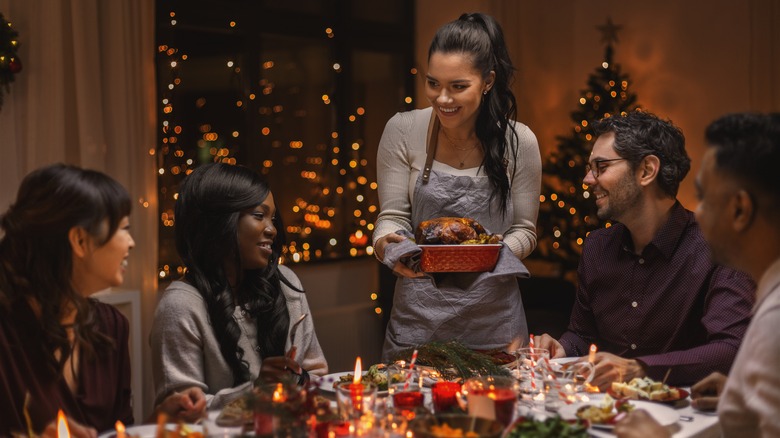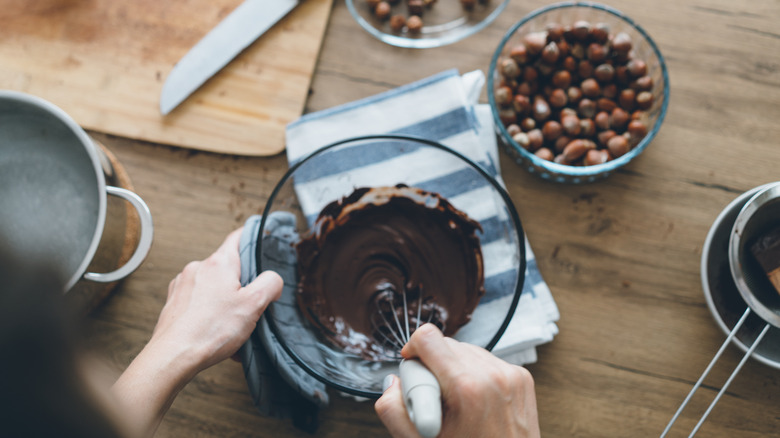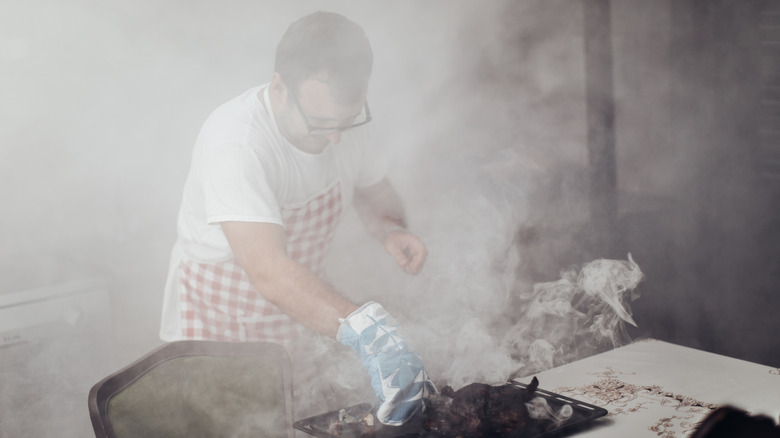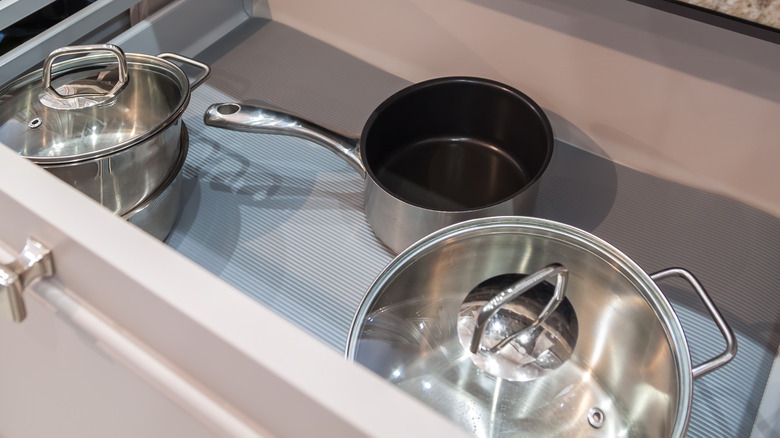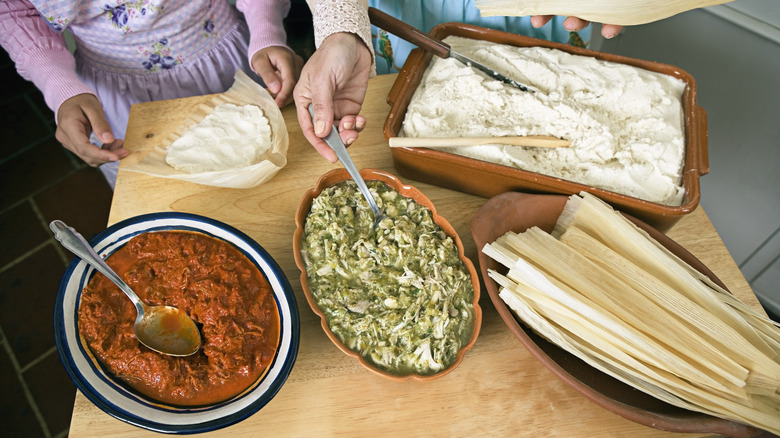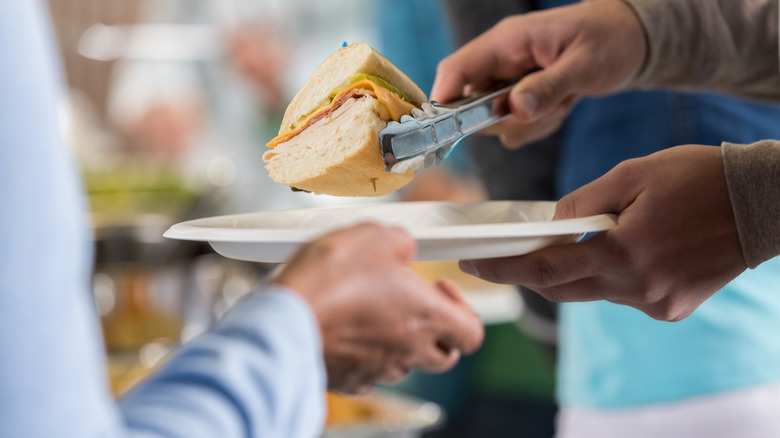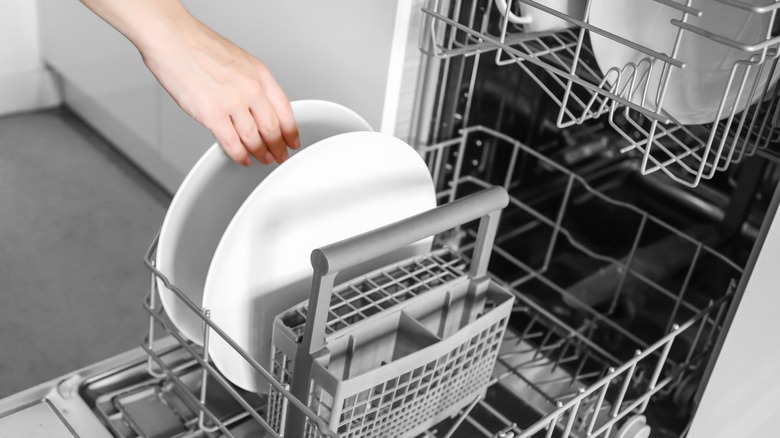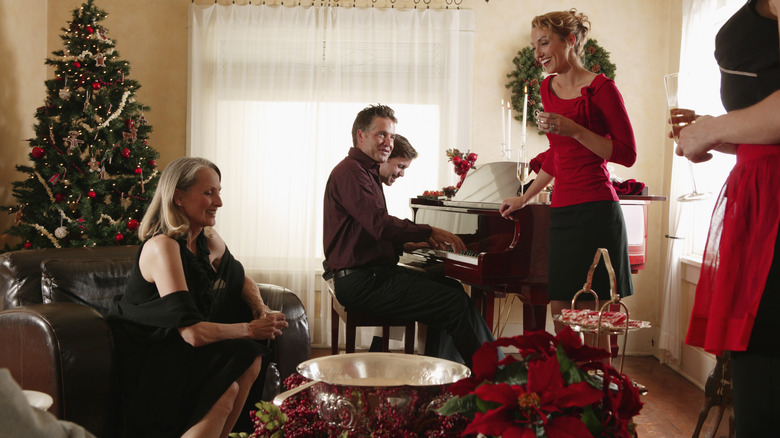Common Christmas Dinner Mistakes To Avoid
If you're lucky enough to host Christmas dinner this year — go you! It means folks know they can rely on you to make their Christmas evening special. Even so, the flattering feelings of adoration only go so far before reality sinks in –- you've got a lot of planning to do and may not know where to start.
Don't worry. Even if you've been in the hosting game a while, there's always a thing or two left to learn about how to serve a large crowd of people. In this post, we'll review some of our most helpful tips for managing a large holiday gathering, both from our personal experiences as well as from others. We've found that your average seasoned home cook usually has tons of information to offer when it comes to getting holiday hoedown just right, and you know we had to scour online forums and resources to provide you with all those tiny nuggets of wisdom to get you ready for one of the biggest holiday events of the year.
Join us as we dish up some of the most common Christmas dinner mistakes we hope you'll avoid this holiday season.
Forgetting to plan your meal ahead of time
Before you do any sort of cooking, you'll first need to plan what it is that you want to cook. This probably sounds super obvious, but there are more details to consider than just what is on the menu. Other factors to consider include how long those menu items take to cook, whether or not they can be prepped ahead, what kind of seasonings and sauces they'll need, and so much more.
Once you've figured out the details and have your list of items made, stick to it. When making your list, it may be easier to make a category for each item you cook (i.e., meat, appetizers, drinks, desserts, side dishes, etc.) before you go shopping. As you begin throwing items into your shopping cart, you'll likely notice that your shopping list keeps you organized and less tempted to buy extra food impulsively. Doing things this way also saves money and, thus, makes for a total win-win situation.
Forgetting to cook ahead of time
It can be easy to feel like everything has to be prepared on the day of the celebration, but honestly, that's simply not true. There are many Christmas dinner items that can be prepared a day or two in advance, leaving you with more room in your schedule to destress on the day of the actual holiday event.
For example, if you've got something you need to bake, you can bake it in advance, or if you'd prefer to have the dish hot and fresh, you can simply assemble the ingredients and place it in the fridge to chill. On the day of, remove the food item from the refrigerator, bake, and serve. Items like casseroles, desserts, gravy, and more are great candidates for preparing ahead of time, saving you time and effort on the day of.
With all of this said, please keep in mind that some entrees and desserts may not last many days in the fridge. Items like homemade whipped cream or foods that have the propensity to oxidize or spoil quickly aren't great options for make-ahead foods, so be sure to consider these things before determining whether to make certain dishes ahead of time.
Making new recipes for the first time
It may be tempting to make a new recipe for Christmas dinner, but that might not always be a great idea. We'll be the first to admit that we've done this plenty of times before; after all, who wouldn't want to try the newfound marinade or cooking technique they've learned that would potentially make the food that much better this holiday? Even so, doing so may prove a great risk if you've never made it before since recipes, especially those without a decent amount of stellar reviews, can go south quickly.
If you must make a new recipe for Christmas dinner, try to at least save it for something you're pretty sure is going to work out and isn't the main course. For example, a fool-proof mocktail, a small batch of cookies, steamed veggies, and the like aren't likely to ruin Christmas dinner, even if it's your first time making them. If, on the other hand, you're attempting to make that brand-new turkey recipe you found online the other night, it may be best to either skip that option or try making it once before Christmas day arrives; that way, you'll know what to expect and there are no last-minute pitfalls that crop up right before dinnertime.
Not taking allergies and dietary restrictions into account
When inviting someone to your home for a meal, you almost always want to check to see if that person has any allergies or dietary restrictions you need to consider. Some restrictions may be more obvious than others, but knowing ahead of time what those limitations are can help you plan what food options you'll offer your guests to make everyone feel included and comfortable.
We'll confess this can get tricky when it comes to larger groups since it may be hard to keep up with everyone's dietary obligations. Still, by making a list of possible allergies and preferences ahead of time, you can choose a few items to provide your guests without changing the entire meal. For example, if you've got a person who is allergic to nuts, you may offer a nut-free dessert alongside your typical serving of peanut butter cookies. If a person hates turkey, you may still offer it, but also make a tiny spiral ham on the side for that particular person to sample.
Again, you don't have to go to the extreme with this since tailoring the dinner according to everyone's preferences may prove challenging. Still, if it's something serious, such as an actual allergy or food intolerance, then you should be sure to provide an alternative for that person to sample, and the only way to know about something like this is to ask about it in advance.
Attempting to grocery shop a few days before Christmas
Now, this may go without saying, but because many of us are procrastinators, it's certainly worth the mention. You won't want to wait until the day before or even a couple of days before Christmas to get your holiday dinner shopping done. By waiting this long to grocery shop, you'll undoubtedly be plagued with long lines, bare shelves, pushy customers, and exasperated store clerks as the holiday rush ensues. Instead, it is a far better option to get your shopping done at least a week in advance — if you can.
We do realize that some of the items you may plan to serve for Christmas dinner need to be fresh and may not last a week in your fridge or on your shelf. In this case, some items, like bread rolls, can be frozen until you're ready to put them to use. For non-frozen veggies, fruits, fresh herbs, and other items, consider curbside pickup or even delivery a day or two beforehand to avoid large crowds associated with the Christmas rush. If you must venture in-store around the holiday, try going as early in the morning as possible. This may improve your chances of avoiding a crowd, though you'll likely still be met with bare shelves — sigh.
Avoiding all pre-made goods
We know that serving pre-made foods at Christmas is an etiquette faux pas for many people, but it really isn't that taboo. Depending on your situation and time constraints, reaching for pre-made foods, even if it's only for certain things, is totally feasible. Have a new baby or lots of kids, or are you going through other things in your life that might prevent you from making everything from scratch? Don't feel bad about reaching for pre-made desserts, steam-in-the-bag veggies, brown-and-serve rolls, canned yams, and more to make hosting easier.
When purchasing a pre-made dessert, be sure to remove the packaging and place the dessert in a fancy dish. If it's something that comes frozen or canned, don't forget to put your own little spin on it to make it special. Making candied yams? Get the canned sort, drain, and throw some butter and brown sugar on 'em over low heat. Pre-made salad kits are also a lifesaver; just be sure not to buy fresh items like this too early, or else you'll risk your salad going brown before you ever get a chance to assemble it.
Not taking into account your cookware
This may be a no-brainer to some, but for novice cooks or those who don't host often, it may be easy to overlook. It's important to pay attention to the types of cookware you'll need to accommodate the types of food you are making. Sure, you may have the right baking dish for your green bean casserole, but will you be using that same dish to whip up your Christmas morning cinnamon rolls? Were you planning to use your saucepan to reheat the gravy but also need it to warm your veggies? All of this takes planning and preparation and may even require buying extra cookware to get it all done.
Not wanting to spend extra money on extra pots and pans? Try copping the disposable foil roasting sort or disposable cake pans to double your cookware inventory for less. You may even consider setting out your utensils ahead of time or buying a separate silverware set that is specifically for hosting events, so you aren't scrambling around to wash up all of the cutlery you've used during the day moments before a flock of guests arrives.
Yes, it's annoying, and yes, it takes lots of preparation. But guess what? The more prepared you are, the easier it will be to host events like these. You've got this!
Misgauging the amount of time needed to cook each item
We've mentioned this a bit earlier, but considering the amount of time each item needs to cook is crucial when planning a Christmas dinner. Let's say your turkey takes three hours to bake in the oven, but your pie only takes 30 minutes. If you don't manage your time wisely, you may end up cooking your turkey right up until guests arrive without much time to bake up your pie. You'll be left flustered when your guests show up as you bustle back and forth across your kitchen, trying to tie up last-minute details for dinner.
To prevent this, make sure to have a written plan for what is to be cooked, how long each item will take, and what, if any, other factors may need to be considered for a good outcome. You may also wish to stagger the times you place certain foods in the oven to prevent everything from getting done at once and potentially burning.
Time management may not seem like a big deal, but once you've mismanaged your time, there's no getting it back. Save yourself the hassle and plan in advance!
Relying too heavily on traditional foods
We might get a lot of criticism for saying this, but you do know it's okay to start your own traditions, right? And while many of us like to savor the familiar tastes of a good old-fashioned holiday meal, shaking things up a bit is cool, too. Consider offering up spicy tamales or ravioli for your next Christmas shindig, or how about a big pot of chili or classic hot wings to celebrate the day? Hey, there aren't any hard and fast rules as to what you should serve for Christmas dinner — if it's something you think most of your guests will like, then we say go for it!
Also, if you'd rather forgo a big meal altogether, that's fine as well. You can try serving heavy appetizers instead of an actual dinner, but be sure to let your guests know that's what you plan to do so that no one is showing up expecting to be stuffed full of traditional Christmas fare.
Being afraid of disposable items
Not everyone will love this tip, and honestly, we understand why. Special occasions are times when many people want to pull out their best plates and china, and for small gatherings, we think this is perfectly acceptable. If you plan to host a large event, however, you may want to consider using disposable plates and silverware instead. It may not feel as special or high-end as using real dishes, but the payoff may be well worth it.
If using disposables makes you shudder, but you don't want a ton of dishes to deal with later either, you could always go the in-between route and do a little bit of both. People hold Chinet disposables in high regard for holidays, and some like to mix things up by offering "real" cutlery while still serving the food on a sturdy disposable plate. Do what you want, but ultimately, what you decide will depend on your situation and how much you're willing to clean up afterward; it's genuinely up to you!
Not considering your space
You may have always dreamed of hosting a large family get-together, but you'll need to be honest enough with yourself and others as to whether you can actually accommodate a large gathering. One or two extra people probably won't matter too much, but having much more than that in a tiny living space may get hectic. Other factors apart from the size of your home may be whether or not you have enough seating and table space for the feast and, if not, what you have planned for people who are unable to fit at the table.
A less chic but doable option is to provide dinner stands for your guests or to get creative with some of your other furniture. Turning ottomans into seating, using small stools, and more are all options for creating space for the people you're hosting. You may also consider pushing large pieces of furniture against walls to make an open space for standing room if needed. All in all, you'll simply need to improvise if hosting in a smaller space; otherwise, don't be afraid to look into rental options for larger venues when necessary.
Not accepting help – sometimes
Believe it or not, this point is a bit controversial, but bear with us here. If you find yourself hosting Christmas dinner for family members, we think it's perfectly acceptable to receive any offers of help. After all, these are the ones closest to you, and they likely know the amount of effort you've exerted into dinner. Thus, we think it's good and right for a family to assist with chores after a big meal.
If, on the other hand, you've got your boss, friends, neighbors, or acquaintances attending, you may want to think twice. Some people may offer to help out of courteousness, while others may barely notice the fact that you even need help. Either way, we think it's best to handle the cleanup rather than expect your guests to do it, especially if your relationship with those people isn't too close.
Also, if you're really short on time or don't think you can handle the entire Christmas spread yourself, you may wish to consider doing a potluck-style Christmas where everyone contributes. This will take some of the pressure off your plate, with fewer dishes and stress to worry about –- and most people will happily participate, so it's truly a win-win!
Methodology
These common Christmas dinner mistakes were devised first and foremost by our firsthand experience with the challenging task of hosting a formal gathering. In addition, we've scoured forums and online etiquette resources to glean any additional information we thought might be helpful in making your Christmas hosting as seamless as possible. We hope you've enjoyed these tips!
